by Rev. Antony W. Ball

In past ages He allowed all nations to go their own way;
and yet He has not left you without some clue to His nature,
in the kindness He shows:
He sends you rain from heaven and crops in their seasons,
and gives you food and good cheer in plenty.
Acts xiv 16,17 NEB
With the very best of intentions, Barnabas and Paul were making a mess of their missionary work in Lystra (a town in what we now call southern Turkey). They miraculously healed a crippled man, which made the crowds think that they were themselves gods. The crowds thought Barnabas was the Greek god Jupiter (because he seemed to be ‘in charge’) and Paul they called Mercury (because he was doing all the talking) and the crowds made preparations to worship them as if they were gods. The apostles protested that they were mere mortals, and had come to bring good news about the one, real, living God, about Whom they said…
In past ages He allowed all nations to go their own way;
and yet He has not left you without some clue to His nature,
in the kindness He shows:
He sends you rain from heaven and crops in their seasons,
and gives you food and good cheer in plenty.
That single sentence says several vital things about God:
In past ages He allowed all nations to go their own way;
…reminds us that God does not impose Himself on us – if we are determined to ignore Him and go our own way, so be it – He respects our free will.
… and yet He has not left you without some clue to His nature, in the kindness He shows:
…reminds us that if we honestly search for God – if we look for the clues He has left, like the beauty and order of the world and all that we can discover through poetry, music, science and technology – then we shall not only be able to find Him but also be able to discern something of His loving nature. The word translated ‘kindness’ there is about doing good things.
Finally…
…He sends you rain from heaven and crops in their seasons,
and gives you food and good cheer in plenty…
…reminds us of the sort of good things God does – not just in harvest terms but “good cheer in plenty”, which the old Authorised Version translated simply as “gladness”.
That simple little story (which I chose because of its ‘harvest’ element) shows that we can’t expect our efforts to make God known will always go smoothly. Paul only narrowly escaped death (see Acts xiv 7 – 20 for the rest of the story) and unsurprisingly he and Barnabas left Lystra the next day, but instead of ‘giving up’ they tried again in Derbe with much more success.